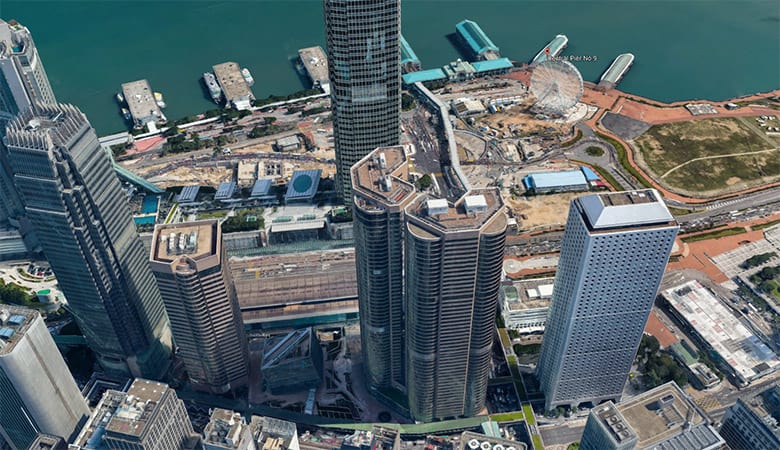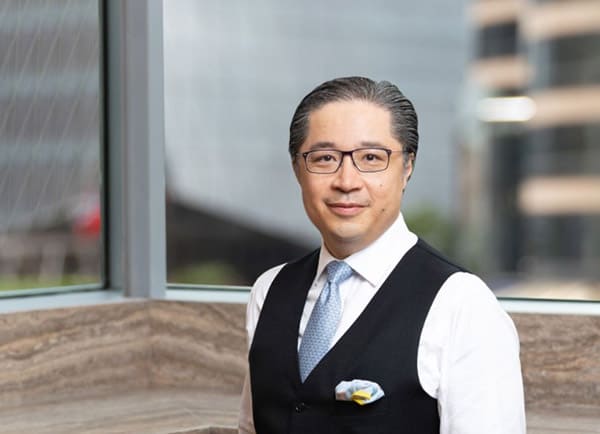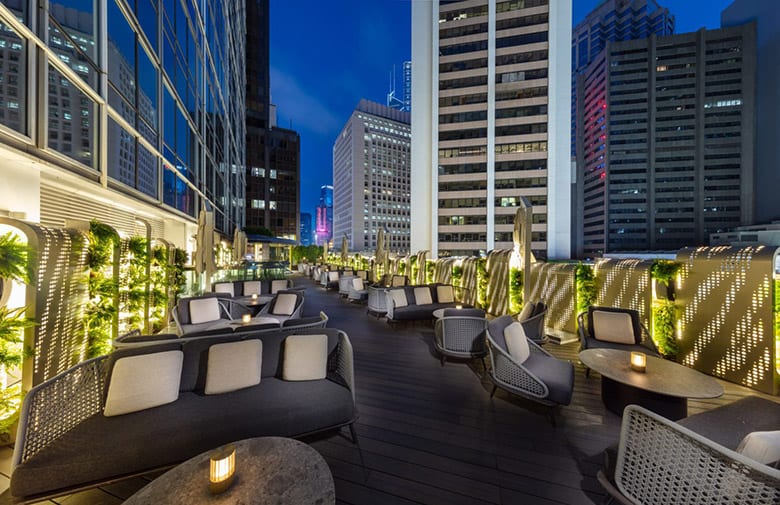
The IFC complex, Exchange Square and Jardine House along Central’s waterfront
Hongkong Land has been leasing out a few more floors in its Exchange Square complex, and the blue-chip developer’s head of commercial property is sounding confident that top corporates will want to stay in the core of the world’s most expensive business district.
“We are still performing much better than the market, and that shows the resilience of the portfolio,” said Raymond Chow, an executive director of Hongkong Land, who is in charge of the firm’s commercial portfolio — much of which forms the core of Central district.
Chow’s optimism may have received a booster shot in April when China Life Franklin Asset Management signed up for a full floor in One Exchange Square, and that deal was signed just before a US financial information provider took up a pair of floors in another tower in the harbourside complex.
The 27-year Hongkong Land veteran seems unsurprised by the leasing rebound, which he sees as testimony to the ongoing importance of Central district.
Thanks to the unmatched density of finance firms in the city’s traditional commercial hub, Chow points to the district’s “unmatched efficiency”, as well as to some work that Hongkong Land has been doing to ensure that properties like Exchange Square, Jardine House and the Landmark complex maintain demand for some of the world’s priciest offices.
Chow’s faith in the market comes despite overall vacancy in Central’s office market rising from 7.3 percent in March to 7.5 percent in April, and an ongoing trend towards major multinationals daring to move their operations to emerging commercial districts such as eastern Hong Kong island and Kowloon East in search of cost savings.
Old Friend Returns
While office leasing in Hong Kong has been sliding since 2019, Hongkong Land managed to push its average rents in its Central office portfolio to HK$120 per square foot last year, from HK$118 a year earlier.

Raymond Chow of Hongkong Land sees Central thriving amid change
During May, however, the owner of properties including Jardine House and the Landmark complex, said that rental reversions in its prime office buildings had turned negative as physical vacancy rose to 7.6 percent by the end of March, compared with 6.3 percent at the end of 2020.
In its report on the first quarter, however, the company said that new office leasing “saw a modest increase in the period as a result of improved sentiment and a narrowing rental gap between Central and other parts of the city”.
Chow sees that increase in business confidence coming from a number of sources.
“People feel like the vaccination process is much better, and also the dynamics and the strength of the IPOs in Hong Kong is just fantastic,” he said. And he links this rebirth of Hong Kong’s commercial spirit to signs of recovering activity in the company’s office portfolio.
“We’ve been seeing a lot of demand coming in,” Chow said. “Recently we announced Standard & Poor’s is coming back into Central, and they are taking roughly 22,000 square feet in Exchange Square. These are signs that the market is gaining, and there’s no doubt that the level of inquiries is rising.”
After having decamped from Hongkong Land’s Edinburgh Tower for a Kowloon location in 2012, Standard & Poor’s S&P Global division moved into a two-floor space in Three Exchange Square at the beginning of May.
Chow also points out that despite a slide in rents at the macro level, its latest major lease in Three Exchange represented a positive rental reversion from a previous agreement covering the lower zone space.
“The overall ecosystem which we provide is quite unique and we see this as a flight to quality,” he added.
Market Data Points Downhill
Chow is keeping his towers full despite the Grade A office market in Hong Kong having contracted 99,400 square feet in April, according to the latest figures from JLL, after a 100,500 square foot contraction in March.
Other issues arise from the emergence of alternative business hubs in Hong Kong, where Central has long reigned as the preferred location for companies seeking prestige addresses and top talent.
Earlier this year, Swiss bank Julius Baer leased four floors in Swire Properties’ Two Taikoo Place development in Quarry Bay, and in April, Canadian insurer Manulife was reported to have signed Hong Kong’s biggest office lease of the year at PAG’s International Trade Tower in Kowloon East.
Despite the competition, Chow is confident that Central remains at the core of Hong Kong’s commercial culture. His firm is already adding amenities to ensure that the elite of Asia’s financial capital feel pampered in the glass and steel towers.
Chow notes that Hongkong Land is already at work ensuring that its Central portfolio caters to an emerging generation of business leaders in the city.
“The business elite and the need for efficiency in Central hasn’t changed that much, but we are seeing lifestyle changes and we are providing a lot of amenities to the new generation of business leaders,” Chow said. “We’re changing our real estate to make sure that we capture the new generation of leaders.”
Space With a Side of Service
With boundaries between work and life disappearing, Hongkong Land has developed new services for tenants and novel features in its portfolio to satisfy the latest version of Hong Kong’s business elite.

Hongkong Land introduced Centricity and its social spaces in 2019
After introducing its Centricity online-to-offline service suite in 2019 to help tenants access concierge services, book event spaces or even order lunch, in 2020 the company set about refreshing some of the retail options in its Central properties.
At Jardine House, Hongkong Land introduced a new food hall in the basement level aimed at providing tenants with access to eight food outlets and two bars that can be refreshed on an alternating basis.
More new F&B outlets are on the way in 2021, Chow says, and in the longer term the company is working on ongoing upgrades to keep up with its demanding clientele.
“One of the things that we are working on is the 5G platform, which we’re hoping to integrate into the whole portfolio,” Chow said. “That opens huge opportunities for integration and interaction for landlords with anyone who works in Central.”
Chow sees this tech integration as another element that will maintain Central’s status as Asia’s commercial hub in the years to come.
“The elite business leaders in any segment will still be there, and if you walk into Central you will be able to do more business there than in anywhere else in the world,” he said.
Leave a Reply